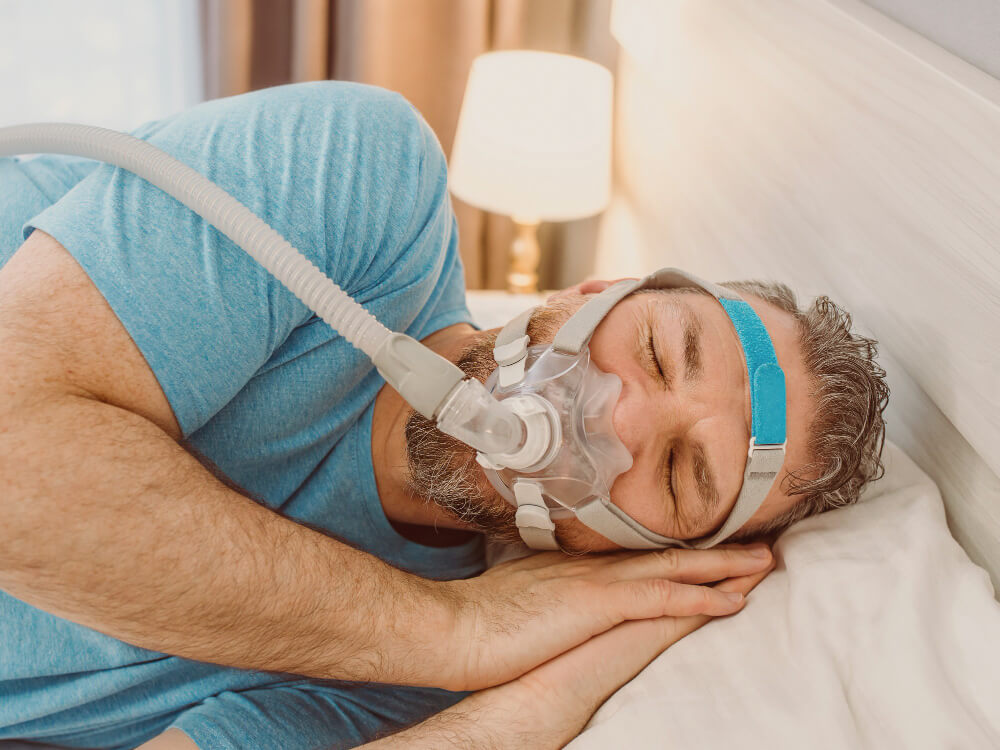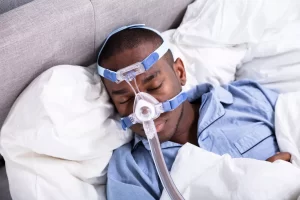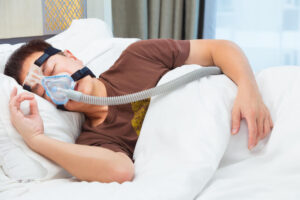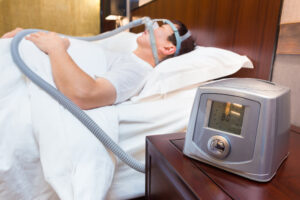CPAP therapy is the most effective treatment for obstructive sleep apnea (OSA). It works by delivering a continuous stream of pressurized air through a mask that you wear over your nose and mouth. This pressurized air helps to keep your airway open during sleep, preventing the pauses in breathing that are characteristic of OSA.
CPAP stands for Continuous Positive Airway Pressure, and it involves using a machine to provide air pressure through a mask which covers the nose and mouth during sleep. This helps keep the airways open, allowing oxygen to enter more easily.
People who suffer from sleep apnea often find that they get an improved night’s rest when they use CPAP therapy regularly. Additionally, it can provide relief from other conditions such as snoring or nighttime anxiety. With these potential benefits in mind, let’s take a closer look at how CPAP therapy works and what it can do for you.
Table of Contents
Potential Health Benefits Of CPAP Therapy
Snoring and nighttime anxiety can be disruptive to your sleep, but thankfully, CPAP therapy may provide a solution. This type of therapy uses a device that pumps air through a mask and into the user’s nose or mouth. The air pressure helps keep the airways open, allowing you to breathe more easily and reduce snoring. CPAP therapy isn’t just beneficial for relieving snoring and anxiety; it also has several potential health benefits as well.
CPAP therapy might help reduce high blood pressure levels, which can lead to stroke, heart attack, or other cardiovascular diseases. In addition, people who frequently suffer from sleep apnea could benefit from CPAP therapy too. By improving breathing during sleep, the user can wake up feeling less tired since their body isn’t having to struggle for oxygen throughout the night. CPAP therapy may even help improve focus and alertness during the day since users won’t have suffered from an interrupted night’s rest. As such, this form of treatment could potentially benefit both physical and mental health in the long run.
Improved sleep quality
CPAP therapy can help you to sleep more soundly and wake up feeling refreshed. This is because CPAP therapy prevents the pauses in breathing that are characteristic of OSA. These pauses in breathing can disrupt your sleep, causing you to wake up frequently or to feel tired during the day. CPAP therapy can help to reduce the number of these pauses, allowing you to get a more restful night’s sleep.
CPAP therapy works by providing continuous air pressure to keep your airways open throughout the night. This helps you to breathe more easily and consistently, which in turn results in a much better sleep experience. Not only does it reduce snoring, but it also allows for deeper and more restful sleep cycles. Additionally, you’ll wake up feeling refreshed and energized instead of exhausted and groggy. The improved quality of sleep you experience when using CPAP therapy can have a very positive impact on your overall health and wellbeing.
Reduced daytime sleepiness
CPAP therapy can help to reduce daytime sleepiness, which can improve your alertness and productivity. Daytime sleepiness can be a major problem for people with OSA. It can make it difficult to concentrate, remember things, and make decisions. It can also make it difficult to stay awake at work, school, or while driving. CPAP therapy can help to reduce daytime sleepiness, allowing you to be more alert and productive during the day.
Improved cognitive function
CPAP therapy can help to improve your concentration, memory, and decision-making skills. OSA can have a negative impact on your cognitive function. Studies have shown that people with OSA have problems with concentration, memory, and decision-making. CPAP therapy can help to improve these cognitive functions, allowing you to think more clearly and make better decisions.
Reduced risk of heart disease
CPAP therapy can help to reduce your risk of heart disease by improving your blood pressure and heart rhythm. OSA is a risk factor for heart disease. People with OSA are more likely to have high blood pressure, irregular heartbeat, and heart attacks. CPAP therapy can help to improve these risk factors, reducing your risk of heart disease.
Reduced risk of stroke
CPAP therapy can help to reduce your risk of stroke by improving your blood pressure and reducing your risk of blood clots. OSA is a risk factor for stroke. People with OSA are more likely to have high blood pressure and blood clots. CPAP therapy can help to improve these risk factors, reducing your risk of stroke.
Reduced risk of diabetes
CPAP therapy can help to reduce your risk of diabetes by improving your blood sugar control. OSA is a risk factor for diabetes. People with OSA are more likely to have insulin resistance and high blood sugar levels. CPAP therapy can help to improve these risk factors, reducing your risk of diabetes.
Reduced risk of accidents
CPAP therapy can help to reduce your risk of accidents by improving your alertness and reducing your daytime sleepiness. OSA is a risk factor for accidents. People with OSA are more likely to have car accidents, falls, and other accidents. CPAP therapy can help to reduce these risks, making you safer.
Improved quality of life
CPAP therapy can help to improve your quality of life by improving your sleep quality, reducing your daytime sleepiness, and improving your overall health. OSA can have a negative impact on your quality of life. It can make it difficult to work, socialize, and enjoy life. CPAP therapy can help to improve your quality of life, allowing you to live a more fulfilling life.
Relief From Snoring And Nighttime Anxiety
CPAP therapy has been known to provide relief from snoring and nighttime anxiety for those who suffer from sleep apnea. It is an effective treatment that can drastically improve quality of life for those affected by these issues. The use of a CPAP machine helps to ensure proper airflow throughout the night, allowing individuals to get the restful sleep they need. This improved air flow helps to reduce snoring and other breathing-related issues during the night, providing a better night’s sleep with fewer disruptions. Additionally, many people find that using a CPAP machine can help reduce feelings of anxiety or stress associated with sleep apnea, as it allows them to feel more secure knowing their airways are being monitored. With regular use of a CPAP machine, many individuals experience improved overall well-being due to better quality of sleep and less stress associated with their condition.
Reduced Symptoms Of Sleep Apnea
CPAP therapy is an effective treatment for sleep apnea and can help reduce the symptoms of the condition. Patients using CPAP therapy often experience better quality of sleep and improved alertness during the day due to the increased oxygen levels in their blood. Using CPAP helps to open the airway and keep it open, allowing more air to flow into the lungs while reducing snoring, which can cause disruption to both you and your partner’s sleep.
CPAP also has a positive effect on other health problems related to sleep apnea, such as high blood pressure, headaches, and fatigue. Many people who suffer from sleep apnea find that CPAP therapy has improved their overall energy level and quality of life. With regular use of CPAP, patients may even be able to reduce or eliminate medications associated with treating their sleep apnea symptoms. With its many benefits, it’s no wonder why CPAP therapy is one of the most commonly prescribed treatments for sleep apnea today.
Overall, CPAP therapy can help improve a person’s quality of life by providing relief from the disruptive symptoms associated with sleep apnea. It can provide long-term benefits for those suffering from this condition by increasing oxygen levels in their blood and reducing other health issues related to the disorder. In addition to these physical benefits, many people report feeling more rested and energetic after implementing CPAP into their nightly routine.
How CPAP Therapy Works
CPAP therapy is a popular treatment for sleep apnea. It involves the use of a mask connected to a machine that delivers air pressure to keep your airway open while you sleep. The air pressure is generated by the CPAP machine and delivered through the mask, which fits over your nose and mouth. This helps ensure that your body gets enough oxygen while you sleep.
The mask may be uncomfortable at first, but most people adjust in time and find the therapy helpful. With regular use, CPAP therapy can reduce snoring, improve breathing and give you better quality sleep. It can also help reduce daytime fatigue and improve overall health and wellbeing. In addition, it can lower blood pressure, reduce risks of heart attack or stroke, and even help improve concentration during the day.
Frequently Asked Questions
Is CPAP Therapy Covered By Insurance?
Yes, CPAP therapy is usually covered by insurance. Most insurance providers cover CPAP machines and masks as durable medical equipment, so you don’t have to worry about out-of-pocket costs. Additionally, some companies may even cover the cost of CPAP supplies, such as tubing and filters. If you’re unsure about your coverage, it’s best to contact your provider directly to confirm.
Is CPAP Therapy Comfortable?
CPAP therapy can be surprisingly comfortable, with the right mask and settings. If you have a good fit, it should feel like a gentle breeze of air on your face while you sleep. Many people find the sensation calming and actually prefer the feeling of using CPAP to not having it. If you’re having trouble finding a comfortable mask or settings, don’t hesitate to contact your doctor or therapist for help.
How Often Should CPAP Therapy Be Used?
CPAP therapy is a type of treatment used to help people with sleep apnea breathe more easily during sleep. It should be used every night, if possible, to ensure the most effective results from the therapy. Depending on your specific situation and severity of your sleep apnea, your doctor may recommend using CPAP for certain periods of time throughout the day. In any case, it’s important to follow your doctor’s instructions for when and how often you should use CPAP therapy.
Are There Any Side Effects Of CPAP Therapy?
Yes, there are some side effects of CPAP therapy. The most common side effect is discomfort, which can range from feeling claustrophobic to having facial irritation. Other reported side effects include dry or stuffy nose, sore throat, air leaks, and sinus congestion. In some cases patients may experience a headache or increased mucus production as well. It’s important to talk with your doctor if any of these symptoms persist or become bothersome.
Is CPAP Therapy Suitable For All Kinds Of Sleep Apnea?
CPAP therapy is a common treatment for sleep apnea, but it isn’t suitable for everyone. Patients with mild sleep apnea may not need to use the therapy and instead can try lifestyle changes or other treatments. For those with moderate to severe forms of the condition, CPAP is often recommended as it helps keep airways open during sleep and reduces the risk of heart problems associated with untreated sleep apnea. It’s important to speak to your doctor about what type of treatment is best suited for you.
Conclusion
CPAP therapy is a great way to treat sleep apnea, and it can improve your overall quality of life. It’s important to make sure that your insurance covers the cost of CPAP therapy, so you don’t have to worry about the financial burden. Additionally, it’s important to find a mask that fits comfortably and use it for the recommended amount of time each night. There are some potential side effects associated with CPAP therapy, but they’re usually mild and can be managed with proper use. Ultimately, if you suffer from sleep apnea, CPAP therapy is an effective treatment option and I’d recommend giving it a try!




